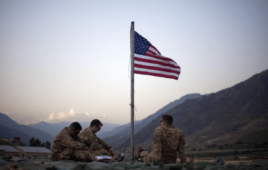
The Emergence and Expansion of ISIS-K and the Taliban
The Taliban blamed ISIS-K for the Kabul explosion on Afghanistan’s largest military hospital near Kabul, killing at least 30 people and wounding dozens this Tuesday. Though there is no immediate claim of responsibility, it’s more likely that IS-K is behind the attack. IS-K has carried out some of the deadliest attacks since its appearance in 2015.
This included the August 26 suicide bombing that killed 13 US service members and 180 Afghans at Kabul airport. Hundreds have been killed and wounded in two separate suicide bombings this past month, in Kundoz and Kandhar at two Shia mosque gatherings.
One of the group’s greatest strengths and factors that sets them apart from the Taliban is not only their ability to leverage the local expertise of its fighters, but also the funding they have.
There is substantial evidence that the group has received money, exceeding $100 million, along with training and advice from the group’s core organizational body in Syria and Iraq. With their funding and expertise, IS-K has launched numerous attacks in both Afghanistan and Pakistan, creating chaos, uncertainty, and fear – one of their main goals.
Background
The Islamic State of Iraq and Syria (ISIS) is one of the deadliest and well-known terror groups the world has known. Emerging in the Middle East due to inter-state fragility, failed foreign policy, and instability in the region, ISIS emerged as a force to be recognized and feared. ISIS is present in Afghanistan under the name the Islamic State Khorasan, also known as IS-K. It was formed in Pakistan in 2014 and later appeared in Afghanistan in 2015 at the height of ISIS’s power in Syria and Iraq.
Moreover, they are known as the most extreme and violent of all the jihadist militant groups in Afghanistan and one of the top four deadliest terrorist organizations in the world.
The group recruits both Afghan and Pakistani jihadists, especially members of the Taliban who do not see their own organization as extreme enough. Throughout its history, IS-K has carried various attacks on different targets. This has included Afghan security forces, the Taliban, US and NATO forces, religious monitories, Afghan politicians and ministries, international organizations, and many more. Consequently, there will be an increase in activity by IS-K due to the instability of Afghanistan.
Different in idea, same in nature
IS-K and the Taliban are two different sides of the same coin. Both are extremist groups, fighting for the same idea, but with different goals, both voicing their disdain for each other. However, ISIS and the Taliban are not as different as IS-K claims to be. One of the reasons is that IS-K is essentially copying attacks and tactics that the Taliban deployed in the past. One example is in the northern part of Afghanistan in the Balkh Province, IS-K is expanding in the eastern and northern provinces with their night operations and coordinated terror attacks, while in the day they are dormant. This draws a parallel to the Taliban who has and is doing the exact same thing.
Moreover, as IS-K and the Taliban are strategic rivals with IS-K branding the Taliban as “filthy nationalists” who only want to form a government within the borders of Afghanistan and therefore contradicts the IS’s goal of establishing a global caliphate, one would assume that IS-K would adhere to different strategies. But, IS-K is following similar patterns that the Taliban launched against the government over the past 20 years. For example, almost a year ago on the 12th of May 2020, the Taliban attacked a maternity ward of a hospital in Kabul. On the 2nd of November 2021, IS-K launched an attack on Afghanistan’s largest military hospital near Kabul.
The only thing that really sets the groups apart is that the Taliban is struggling against ISIS as they do not have the same training and resources to enable them to maintain their power. To further emphasize the similar patterns, ISIS knows that in order to obtain power for political objectives, violence is the key.
Therefore, ISIS is taking the same measures that the Taliban took to gain the same power in the name of jihad. Consequently, the method of their attacks and strategies are very similar to those of the Taliban. IS-K simply justifies their tactics as being better, even though most of the attacks and methods are the same as the Taliban.
What is next for ISIS-K and Afghanistan?
Since its emergence in 2015, IS-K is continually growing and expanding. Not only is this because IS-K is conducting more attacks and gaining more territory, but also because Afghanistan is a country ridden in poverty. Most people think that people join ISIS or IS-K due to religious causes, but it is quite the opposite.
Many people, especially youth join ISIS to get out of poverty. Furthermore, it is a historical fact that poverty has determined the fate of many Afghans. So, while the Taliban struggles to maintain power in Afghanistan with the financial crisis along with the fact that half of the country is facing starvation before the winter, there is and will be a rapid increase in IS-K fighters because they will have the opportunity to gain money when joining to provide for their families.
Additionally, it is a researched fact that one of the main incentives for people to join extremist groups is economic hardships and poverty. For example, CNN reported an Afghan father selling his daughter in order to take care of the rest of his family. The money being offered to new recruits with or without experience is a huge reason for the increase in IS-K soldiers. Moreover, this is occurring while the Taliban cannot afford to pay their own soldiers. This tells us that the trajectory of the number of IS-K fighters in Afghanistan will increase because there is more money involved.
Looking Forward
With more and more attacks occurring, it is not senseless to expect even more. It will be important for international players and organizations to actively aid the civilians caught in the middle, who are being treated as collateral damage. There is a lot to be done in order to stabilize an increasingly fragile and hostile area. Relative peace is not on the horizon, but there must be steps in motion to aid in the facilitation of some sort of coordination in the nation.



